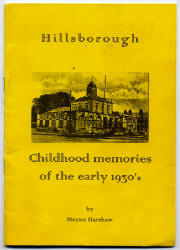 |
No part of this publication may be reproduced or transmitted in any form or
by any means, electronic or mechanical, including photocopy, or any
information storage and retrieval system, without permission in writing from
the author.
Typesetting, printing and binding by
The Oaks Secretarial
Services,
51, Glebe Road, Ahoghill,
BT42 2QW,
Co. Antrim,
Northern Ireland. |
|
This booklet has been published with the
kind permission of its author Mr. Mayne Harshaw. |
* * * * * * * * * * * * * *
A RURAL
VILLAGE
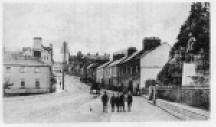 From my bedroom window, in a large terrace house, the whole Lagan Valley
stretched out before me, past Colin and Divis and beyond the Cavehill to a
tiny speck which Father said was Knockagh Monument. From my bedroom window, in a large terrace house, the whole Lagan Valley
stretched out before me, past Colin and Divis and beyond the Cavehill to a
tiny speck which Father said was Knockagh Monument.
Up six flights of stairs at the very top of the house that window was a
very special place for me. All the sounds of a rural village drifted up, the
squealing pigs about to be fed in Magee's yard, (No 10) the intermittent
ring of the anvil in Gordon's blacksmith shop, the distressed roar of a cow
separated from her calf over in Brown's yard (The Plough). I could gaze over
the rooftops and chimneys and see what was happening down at Bell's corner,
the focal point and hub of activity in the village. I could watch the swans
in the Castle lake chasing off a stranger or I could count the cats
contentedly asleep on top of Allen's wall. Each morning I would know if I
was early or late as I traced the progress of the Dublin train by the trail
of steam disappearing and emerging as it sped along the distant valley, the
fastest form of public transport in those days.
When the soldiers were quartered in the Castle the tinny sounds from a
gramophone would reach me from a small window high up in the wall. I often
wondered what the white owl thought about those strange sounds. He occupied
a hole in that same wall and in moonlight I could see him clearly. He made a
funny wheezing sound like heavy breathing and lent credence to my boast that
we had a real ghost in our garden.
In the early 1930's Hillsborough was a very small rural village with just
over one hundred and fifty dwellings and some four hundred folk. The village
ended on the Dromore road at the rectory now a school; at the Northern Bank
on Ballynahinch street and at the end of the houses on the west side of
Lisburn street.
Several residents engaged in farming, grazing their livestock in the
surrounding fields leased from the Downshire estate. Others like Dr Willie
Boyd and Canon Matchett kept a cow and milk surplus to domestic requirements
was used to rear a calf. As well as cattle, pigs and poultry were reared in
the village farmyards. After milking, the cows would be allowed to straggle
out the road on their own, to be pursued later by someone on a bicycle who
would direct them up the Grove to the right field. At harvest time hay and
straw were brought in and in Spring the inevitable would be carted away to
fertilise the fields.
A Fair was held on the third Wednesday of each month and cattle would be
driven in from as far away as Dromore. The animals were herded in little
groups in the Square and against the wall out the Dromore road. The Shambles
was only used to leave animals while the deal was sealed in the traditional
spirit in Brown's pub. There was a lot of muck and residents in the Square
spent the late afternoon washing down the footpath and the walls of their
premises. Sam Stewart, being a civil engineer, had a hose but the rest
relied on buckets and brushes.

While the Hill family were absentee landlords the Downshire estate still
exercised considerable influence owning property and land. Their local
agent, George Allen lived next door. At ten in the morning he would saunter
across the Square to his office at the side of the Market house, a gracious
gentleman enjoying the prestige of his position. Immaculately dressed with
gold chain strung across his waistcoat, he wore gaiters over his shoes and
carried a silver headed stick or umbrella. Only he had been entertained in
the Castle and when the Duke and Duchess of Abercorn walked to church on a
Spring morning George Allen followed discreetly, eventually to be noticed
and engaged in conversation. The Governor occupied the Royal pew but George
was well content in the Downshire pew.
His house was full of antiques and ornaments, a veritable minefield for a
small boy to move in, yet he was a kindly man and showed me how to activate
the secret drawers and prise open little silver boxes. He had of course the
latest wireless, few houses had any kind of receiver, and on a Sunday
evening I would accompany my parents to listen to a service from St Martin's
in the Fields in London. Keeping still and quiet was sheer tedium. Years
later when I had come to appreciate the beauty of Evensong I would recall
those evenings as I sweltered in a little Anglican church in West Africa.
The Downshire estate had a small workforce to maintain buildings and
other amenities around the village and they were based in the Hotel yard. I
always thought of them as very old men but perhaps this was because they
moved slowly trundling a wooden wheelbarrow with an iron shod wheel. On one
occasion they replaced a ceiling in the Parish organist's house in
Ballynahinch street. Unfortunately on leaving they slammed the front door
and down came the new ceiling leaving Mr Foster and his wife devastated. It
was said, "they never stopped on their step".
It was George Allen who patiently explained to me that the village was
not named after its main physical feature. The Hill family had built the
village, hence the name Hills Borough. This greatly surprised me, for the
hill was a constant source of drama presenting as it did a severe challenge
to those early vehicles. Long before the smooth transmission gearbox the
cautious driver stopped at the War Memorial and engaged lowest gear and
proceeded up at walking pace. Others tried to change gear half-ways up,
often with disastrous results. The engine would stall, brakes would fail to
hold and the lorry would roll back into the railings of houses or wipe out
the petrol pump at Johnston's. Coming down was just as hazardous especially
in frost and many came to grief. A furniture van and trailer coming from
Dublin ended up against the Hillside bar and Baxter's next door, preventing
the occupants from using their front doors over the week-end. A severe snow
storm isolated the village and after a week there was great excitement when
Lowry's milk lorry arrived from Belfast to collect milk from the Park. Of
course the hill was impassable but the farm manager George Lowe brought down
three Clydesdale horses and hitched them to the lorry. It was a thrilling
sight to see those magnificent animals whisk the lorry up the hill at a
canter, flurries of snow catching George in the face as he perched
precariously on the mudguard.
It was still the age of steam. Finney's of Banbridge had a steam lorry
with solid rubber tyres which passed through the village to collect timber
in Belfast. Road contractors had steam rollers with a large wooden caravan
attached in which the roadmen slept. Best of all were the circus engines
with their gleaming brasswork drawing three or four wagons. Farms had not
been mechanised and horses and carts were the norm. The East side of the
hill was left untarred to prevent horses slipping on the way down. Sometimes
a horse would refuse to draw the load and passers-by would come to the
driver's assistance, pushing, shouting, and using other physical means of
encouragement. Never a day passed without some excitement on the hill.
On Saturdays in Winter a man came from the Montaighs on the shore of
Lough Neagh beyond Lurgan with a cart piled high with turf and fir. The
latter was wood dug out of the bog and used for kindling fires. When the
cart was completely empty he adjourned to Brown's pub. At nine o'clock he
would be hoisted up into the cart, the nosebag removed from the patient
horse and off they set into the darkness at a steady pace. The horse in
complete control would carry his Master safely home. In Summer another man
came from Ardglass with boxes of herring on a flat cart drawn by a pony. It
was the only fish we ever ate, a baker's dozen i.e. thirteen for a shilling
to be eaten immediately and two dozen to be potted in vinegar became a
rationed delicacy for the rest of the week.
The Hotel in the Square, where the Council Offices are now, had ceased
trading as such and part was divided into two flats. One was occupied by
Jimmy Allen whose Father was Downshire's agent. He was one of the characters
of the village and had the lifestyle of a gentleman of means, his Father's
position assuring entree to the best places. As he went about the village it
was noted that he changed his clothes two or three times a day. This
sartorial effort must have been tiring for he was wont to turn aside for a
little refreshment. He and his wife Elsie had no children but they organised
very good children's parties and that was when we got to peep into the
ballroom with its ornate ceiling and little galleries which by then were in
a dangerous condition.
The other tenant was James Mageean who was a well known and successful
actor in the theatre in Belfast. His daughters Yvonne and Yoland were also
very talented. One day he failed to secure the handbrake on his little car
and in his absence it took off down the hill. Fortunately it veered off
course and nearly ended up in the basement kitchen of the house next door.

SCHOOL
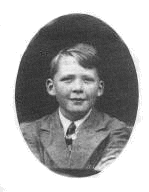 My schooldays were spent in the Presbyterian Church school which was
approached up the lane and through a small gate between the gable of the
church and an old teacher's residence. Many of the pupils came from the
surrounding farming community and therefore walked quite a distance. From
the Dromore side came the McAuley's from above McKee's Dam as did Lawson
Cochrane. The younger Ward's Enna, Evelyn and Lucy were one Irish mile out
according to the old Irish milestone. The Harper's lived at the Ballygowan
turn and much further down that road came John and Charley Gibson from
Hollowbridge House. Gladys and Daisey Smyth lived on the Maze road. Coming
from the Newport direction were Teddy Hamlin, George Cairns and Tommy
McMullan along with the Coulter's from Eglantine House and the McBride's
from Culcavey House. Tom Tate and his sister walked the Ravarnette road
along with Jim Walsh. The Crothers' girls had only to cross the road along
with John Harvey. I have never heard the name since but yes there was a girl
called Myrtle Sparrow. Lily McCann stuck the point of her pencil in my thigh
and I have the mark to this day. I ran home for lunch each day with Billy
Baxter and we prided ourselves in being able to run up the hill without
stopping. My schooldays were spent in the Presbyterian Church school which was
approached up the lane and through a small gate between the gable of the
church and an old teacher's residence. Many of the pupils came from the
surrounding farming community and therefore walked quite a distance. From
the Dromore side came the McAuley's from above McKee's Dam as did Lawson
Cochrane. The younger Ward's Enna, Evelyn and Lucy were one Irish mile out
according to the old Irish milestone. The Harper's lived at the Ballygowan
turn and much further down that road came John and Charley Gibson from
Hollowbridge House. Gladys and Daisey Smyth lived on the Maze road. Coming
from the Newport direction were Teddy Hamlin, George Cairns and Tommy
McMullan along with the Coulter's from Eglantine House and the McBride's
from Culcavey House. Tom Tate and his sister walked the Ravarnette road
along with Jim Walsh. The Crothers' girls had only to cross the road along
with John Harvey. I have never heard the name since but yes there was a girl
called Myrtle Sparrow. Lily McCann stuck the point of her pencil in my thigh
and I have the mark to this day. I ran home for lunch each day with Billy
Baxter and we prided ourselves in being able to run up the hill without
stopping.
Mrs McCready taught the infants at one end of the school in a small room
divided off with a solid partition. It was the warmest place in the school
having the benefit of a barrel shaped boiler which centrally heated the
building and was replenished with coke from time to time by the Master. As
well in winter there was a small American stove on which Mrs McCready cooked
lunch for her husband and herself and dried the dripping pupils on wet
mornings. As infants we wrote with chalk on little blackboards or slates and
rhymed the alphabet off a large blackboard on which each letter was
illustrated, A for Apple etc.
Miss Patton, who travelled from Finaghy each day taught in the middle
room. The very few people who came to work in the village were quite
different in dress and style. Miss Patton was no exception and had a film
star hairstyle and the latest fashion. In her class we made our first
attempt to write between ruled lines in our writing books and painstakingly
followed the perfect script at the top of the page.
Master McCready ruled supreme at the end of the school divided off from
Miss Patton's room by a partition with glass in the top half. The shouts of
the Master, the noise of the cane and the anguished cry of the recipient
could be heard in Miss Patton's room and sent fear into every heart. It was
little consolation that Miss Patton seemed embarrassed by it at times. Yet
despite the physical punishment or because of it we learnt all the English
grammar likely to be needed in life as well as ten Latin roots each day.
Great emphasis was laid on mental arithmetic which was a daily exercise. The
calculator was in your head - not your pocket.
Because the majority of folk in the village belonged to the Parish
Church, Downshire was the larger school. Being outnumbered we were somewhat
fearful of the Downshire boys who seemed altogether bigger. Lunch hours were
staggered so that we should not meet in the narrow lane between the two
schools. We would play football at one end and half an hour later Downshire
would play at the other. However there must have been a good relationship
between Master McCready and Master Kirkwood. Whenever we saw a Downshire boy
running across our playground as if his life depended on it we knew it
signalled the unexpected arrival of the Schools Inspector. Master McCready
would hurriedly hide the cane in the cupboard and other less intimidating
teaching aids would be brought out and arranged in appropriate locations.
The Master assumed a patient benign pose and we all waited expectantly
hoping this interlude would last as long as possible. Sometimes we got the
all clear, sometimes the Master adjudged the danger past and we would
abruptly revert to our normal regime.

There was one other area of co-operation with Downshire. When we got older
we joined the Downshire boys for a woodwork class which was held in one of
the buildings in the Hotel yard. It may have been organised from Banbridge
Technical School for it was taken by a Mr Waddell who came from there and
wore plus-fours. At that time pupils stayed at primary school until 14 years
of age. For many their schooling ended there so I suppose these classes were
a kind of introduction to work. I never mastered the dovetail joint but a
common interest in rugby got me by with Mr Waddell.
Those of us who lived in the village ran home for lunch; the rest ate
their `piece' in the playground washed down with a drink from the pump out
in the lane which supplied drinking water for the houses at the lower end of
the village. I was not aware of poverty but I have vivid memories of that
`piece'. It consisted of two slices of plain loaf with a purplish stain in
the middle where it had been scraped with blackberry jam. Anyone fortunate
enough to be eating an apple out of season would have been surrounded by
boys begging for the core.
In the afternoon, on the way home, we whipped our tops up Lisburn street,
an ideal surface, the earliest asphalt to be laid in Ulster from the village
to Sprucefield. We climbed the large cannons on either side of the War
Memorial and crawled out to the end of the barrel before dropping off, quite
a drop for a small boy.
When boys reached thirteen or fourteen years of age the school was not a
priority. The attractions of the farm or the chance of a job meant that they
were frequently absent. The Schools' Attendance Officer was a threat to the
innocent as well as the guilty. How could you remember why you were not at
school six weeks ago? He was a terrifying figure, I think his name was
McClatchey, and he rode a motorbike. Consequently he came into school
wearing all his protective clothing and shed only the goggles and the
leather helmet. He was there to frighten the life out of us and had
considerable success.

THE FLOOD
On a winter morning we awoke to overcast skies after a night of severe
storm and heavy rain. As we made our way to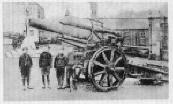 school, little groups of people
huddled at the corner and round the War Memorial looking fearfully up at the
Parish Church. There was an eerie atmosphere which was infectious and folk
seemed shocked and afraid ... something about the lake. school, little groups of people
huddled at the corner and round the War Memorial looking fearfully up at the
Parish Church. There was an eerie atmosphere which was infectious and folk
seemed shocked and afraid ... something about the lake.
The earthworks on the North side of the Fort field which held the man made
lake in check had crumbled during the night. The lake had emptied and a huge
flood of water had breached two walls and swept through the graveyard right
down to the back of Ritchies yard. Taking a chance of being late for school,
Billy Baxter and I ran up the church drive and what a sight met our eyes as
we looked through the gate into the graveyard. It was a scene of
devastation, tombstones were flattened and iron railing around graves torn
out. Mud and debris covered the whole area and there was a muddy pond inside
the gate.
It took the village sometime to come to terms with this strange event. No
one had ever considered the lake to be a threat and the desecration of the
graveyard added a sinister note.

CHURCH
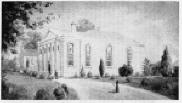 On Friday afternoons the pupils helped Master McCready move back the
partitions and set out the desks and forms in a different pattern in
preparation for Sunday School which we all attended as a matter of course.
Dressed in our best, our suits were a cut down version of our parent's
clothes. On Friday afternoons the pupils helped Master McCready move back the
partitions and set out the desks and forms in a different pattern in
preparation for Sunday School which we all attended as a matter of course.
Dressed in our best, our suits were a cut down version of our parent's
clothes.
While the Master was still there to raise the singing the presence of the
Rev. J. Herbert Orr transformed the atmosphere. The kindest of men, his
winning personality endeared him to children and wherever you met him, on
the street or in the home, he always had sweets in his pocket.
Of course the teachers were different too. Any boy who could recite the
Books of the Old and New testaments without missing a word or the slightest
hesitation was rewarded with a shilling from Bob Beattie. His namesake from
the Two Mile Hill provided wonderful Christmas presents and I can still
remember the little shining penknives. When we got older, the senior class
was held in the church. Here the boys attention often strayed from the
earnest teaching of Sam Smyth of the garage as they strained to hear Miss
Gardiner out of sight on the other side of the church warn the girls about
the evils of lipstick, powder and painted nails. We were seldom
disappointed!
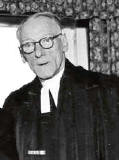 Church attendance was obligatory though the Rev. Orr's splendid
children's addresses made any later tedium worthwhile for a small boy. At
collection time, Josh Morrow wound up his turnip sized pocket watch and
discussed the price of pigs with Hamilton Bell in the back seat. It was not
uncommon for the sermon to be enlivened by the interruptions of a solicitor
James McGifford who would angrily inquire "I suppose you are talking about
me" and got the inevitable reply, "If the cap fits ... !" In those days
Sunday golf and Sunday newspapers were popular targets for the Sabbatarians. Church attendance was obligatory though the Rev. Orr's splendid
children's addresses made any later tedium worthwhile for a small boy. At
collection time, Josh Morrow wound up his turnip sized pocket watch and
discussed the price of pigs with Hamilton Bell in the back seat. It was not
uncommon for the sermon to be enlivened by the interruptions of a solicitor
James McGifford who would angrily inquire "I suppose you are talking about
me" and got the inevitable reply, "If the cap fits ... !" In those days
Sunday golf and Sunday newspapers were popular targets for the Sabbatarians.
There was no electricity in the church and it was lit by some kind of
acetylene gas plant. The installation of a large pipe organ was a great
event as not many wee Presbyterian churches had an organ of any kind. The
air was pumped by hand in a dark space behind the pulpit and the young men
who volunteered for this duty sat in the dark. One went to sleep and the
final praise was delayed until someone woke him up! At the end of the year
the Rev. Orr gave them books as a reward and I laughed at my brother for
getting a prize for blowing! It was a good schoolboy joke.
The Sunday School excursion was an important event in the church
calendar, not only for the children but for the whole congregation and
beyond. Most folk worked six days a week and few were entitled or could
afford a annual holiday. To get a Saturday off and away for a day at the
seaside was a privilege. The Sunday School trip catered for all financial
circumstances and offered a day at Newcastle and two picnic meals for four
and sixpence for adults and a shilling for children. So it was with
tremendous anticipation and excitement that the children, extended families
and friends gathered at Hillsborough station to await the train to
Newcastle. The day would be spent on the sands and at the Pierrots on the
promenade; eating sticks of rock and ice cream and in between sandwiches and
buns in a hall.

COMMERCIAL LIFE OF THE VILLAGE
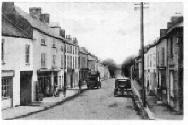 Most shop owners lived above or adjacent to the premises. A small window
in the wall between the kitchen and the shop provided constant surveillance
and enabled the housewife to get on with her chores or the husband to warm
himself at the range in between serving the customers.There was one notable
exception. Most shop owners lived above or adjacent to the premises. A small window
in the wall between the kitchen and the shop provided constant surveillance
and enabled the housewife to get on with her chores or the husband to warm
himself at the range in between serving the customers.There was one notable
exception.
G. & H. Bell's on the corner of Lisburn street was by far the largest
commercial enterprise in the village. There were grocery and hardware shops
at the front and a pork curing unit at the rear together with egg packing
and animal feed stores. It was presided over by Henry Bell, a very gentle
quiet man in a tweed suit who kept a low profile in- a office near the front
door. He and his late brother lived in those two large houses below the
Presbyterian church. He was assisted by his nephews George and Hugh who were
active around the shop. Miss Harper sat in an elevated office at the rear of
the shop framed behind a small window and received the cash via an overhead
trolley - a very modern device in those days. The men who worked in the pork
store emerged at lunchtime draped to their boots in wet salt encrusted jute
aprons and on hot days lay sprawled on the footpath and in the Spring played
marbles at the War Memorial with a childish enthusiasm that belied their
years. Customers were provided with books and an assistant would call at the
house once a week and enter the order. Later in the day the goods were
delivered by a boy pushing a bicycle with a large pannier over a small front
wheel.
There were three other grocer shops in the village. William Beattie and
his wife had their shop (No.7) in the corner of the Square and derived much
of their custom from the rural area. They were very religious and had a
Prayer Meeting on Wednesday nights and a Sunday School on the Sabbath in the
Quaker Meeting House in Park street. Because of their lifestyle and general
serious demeanour they attracted a lot of practical jokes and had a hard
time at Halloween. Josh Morrows's shop (No.20) was in Main street and he was
assisted by his second wife whom he often referred to as the new woman. The
Magill family had their shop (No.29) in Lisburn street and as well as
groceries it was the main supply for paraffin oil at a time when every home
had several lamps and electrification was a distant dream.
The choice of grocer shop was not influenced by price as they all charged
the same. Much depended on tradition linked to credit. If parents patronised
a shop their offspring would do likewise taking advantage of the confidence
which had been built up over the years.
While we were familiar with the owners and their families, the pub itself
was a place of mystery compounded by the fact that-women did not cross the
threshold. Up in the Square the Plough was run by the Brown family and as it
was ever under the watchful eye of the Constable at the Castle, strict hours
were observed. Closing time was heralded by the arrival at the Markethouse
of Mrs Acheson ready to ring the curfew bell and at the same time men would
be gently urged out before the door was firmly shut on the first stroke of
nine o'clock. On Saturday nights they hurried off down Park Lane carrying
quart tin cans filled with porter - a forerunner of the carry-out. At the
bottom of the hill, as well as Ritchies, there were two other pubs which
have long since gone. Stanfields was a large three storied house on the site
of the present Car Park. The gable wall facing the War Memorial was
whitewashed and strange to say it was used by an evangelist-Seth Sykes by
name - to project pictures from a magic lantern . Whatever the subject or
quality of the pictures the novelty attracted the crowds. The other pub in
Lisburn street was until recently a butcher shop. The pub at the end of
Lisburn street was owned by Mr Spence who leant on the half door smoking a
pipe and conversing with the passers-by. The Spence family lived in a red
bricked house on the Carnreagh road and one of his daughters played the
organ in the Presbyterian church.
Johnstons' was a large shop on Main street. It was always an emporium
where a surprising variety of goods seemed to be jostling with each other
for space. Mrs Johnston sold ladies fashions and her son Fred attended the
Lobitos petrol pump and in between sold Duckams oil and thick woollen
longjohns and heavy boots.
Miss Clarke in Lisburn street also sold ladies dresses which were
displayed in the window on life-sized, ever smiling, cardboard figures.
Albert Reynolds was the tailor in Main street (No.16). In the window suit
lengths of cloth were cast over a screen which obscured the work area and
all one saw was the top of his head moving about the room. Miss Gardiner was
a dressmaker in Lisburn street (No.22) who sewed and read the Bible with
equal fervour.

Throughout this century several generations of the Walker family have
tended their butcher shop. In those days the animals were slaughtered at the
rear of the premises. Along one wall of the shop, sides of beef were hung
from which large pieces were cut and placed on a huge tree trunk in the
middle of the floor to be chopped and trimmed to the customers requirements.
On sunny days a frail old Grandpa was brought out to sit on the window sill
beside the door leaning on his stick and weakly responding to the kindly
inquiries of the passersby.
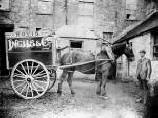 Bread was distributed throughout the village and surrounding countryside
by Bob McCaherty (McCagherty) and two
assistants who drove horse drawn breadcarts. Bob
lived in Main street (No.13) but later moved to the old Gas Works on the
Millvale road. He would make his way slowly up the hill, stopping at
intervals with the cart drawn across the street, the wheel wedged against
the kerb to ease the burden on the horse. A large basket of bread was
carried to each door and the housewife made her selection, not that there
was much choice. The horses would be left at the forge to be shod and how I
envied Tommy and Billy Gordon. sons of the blacksmith, as they rode them
bareback down Lisburn street, with such a clatter, sparks flying from the
new shoes in the gathering dusk. Bread was distributed throughout the village and surrounding countryside
by Bob McCaherty (McCagherty) and two
assistants who drove horse drawn breadcarts. Bob
lived in Main street (No.13) but later moved to the old Gas Works on the
Millvale road. He would make his way slowly up the hill, stopping at
intervals with the cart drawn across the street, the wheel wedged against
the kerb to ease the burden on the horse. A large basket of bread was
carried to each door and the housewife made her selection, not that there
was much choice. The horses would be left at the forge to be shod and how I
envied Tommy and Billy Gordon. sons of the blacksmith, as they rode them
bareback down Lisburn street, with such a clatter, sparks flying from the
new shoes in the gathering dusk.
The Barber Shop was an important institution as most working men did not
shave themselves. Perhaps they lacked the skill to wield a cut-throat razor.
Safety razors were sophisticated devices only available to the affluent.
So, on Saturdays, till late at night, men crowded into that oddly wedged
shaped building on the corner beside Bell's shop. There were two chairs, and
an assistant employed for the day, would soap and lather from an enamel mug
filled with precious hot water taken from the black kettle on the little
open fire. Then Pat Turley with deft strokes and a bit of showmanship would
quickly despatch a week's stubble all the while carrying on over his
shoulder an animated conversation with the waiting customers. It has been
said that knowledge is power and Pat certainly had it as he recounted
amazing stories from the News of the World to an enthralled audience. It was
not so much the dubious affairs of film stars as the accounts of earthquakes
and other natural disasters, the threat of teeming millions of Chinamen, and
the dark secrets of Africa which evoked gasps of disbelief. Pat came from
Lisburn each day and his attractive personality ensured that throughout the
week he had plenty of company as well as customers. A haircut for a
schoolboy cost fourpence and an adult sixpence.
The main confectionery and tobacco shops were Joe McClugan's in the
Square later the Wood's family and William Thompson's at the bottom of the
hill which was also the main outlet for newspapers. The Belfast Telegraph
arrived by bus about 7 o'clock and on a dark winter evening boys went
through the village shouting Telee ah. There was no street lighting and they
could not be seen. A light shining at a door or a whistle guided them to a
sale. There were other little sweet shops and I recall Mrs Clarke's and Mrs
Balmer's. Silvermines were an attraction with the chance of finding a silver
threepenny piece in the centre. I was never lucky!
Bob Beattie had a shoe shop and bred Cocker Spaniels. While Mother was
trying on shoes I was allowed to visit a room at the back and play with the
pups. Shoe repairing must
have been an uncertain trade. There was a shop in the Square beside the
church gate and later I think there was one beside Baxter's in Main street
and later still one beside Ritchies. As small boys we loved to have lots of
sparables on the soles of our leather boots. This gave an authentic ring to
our marching feet as we imitated the sentries at the Castle.
Bicycles were an important form of transport and Albert Johnson's repair
shop with its distinctive smell of light oil and rubber solution was a busy
place in Ballynahinch street. There were few if any bicycles for younger
folk. A small boy would have to put his leg through and under the bar and in
a crab like manner propel the cycle, a manoeuvre only to be attempted at
first on the lawn.
There were comparatively few car owners in the village and surrounding
countryside and they depended on Sam and Davey Smith to maintain and repair
their vehicles at their garage on the Lisburn road. Car bodies did not wear
out but the engines did and had to be re-bored to prolong their life span.
Our first car was a second-hand Clyno; a two seater with a canvas roof,
right hand gear change and the only access was a door on the passenger side.
If the engine stalled we all had to get out to allow Father to swing the
starting handle at the front. Later we graduated to the £100 Ford.
Old man Lilley made farm carts. I was never in his workshop but glancing
down an entry off Main street there was always a bright new orange painted
cart with large iron shod wheels and shafts with black painted ends.
I was familiar with the Northern Bank being sent by Master McCready on
Monday mornings to lodge the church collection. Miss Crane in the Post
Office (No. 2 Main St.) was a formidable lady and the dark premises, bare
wooden floors and high mahogany counter combined to make a visit an
intimidating experience for a small boy. Even Sergeant Hosford in the
barracks (No.7) across the way seemed less a threat.

THE CASTLE AND ROYAL VISITS
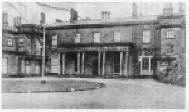 For a small boy the Castle was a place of mystery and exclusion. The first
Governor of Northern Ireland, the Duke of Abercorn, only occupied the Castle
for short periods in connection with official duties. Then there was all
the military ceremonial of changing the guard, sentries being posted and
marching up and down and in the evening the Last Post and the flag lowered
on the Castle roof. For a small boy the Castle was a place of mystery and exclusion. The first
Governor of Northern Ireland, the Duke of Abercorn, only occupied the Castle
for short periods in connection with official duties. Then there was all
the military ceremonial of changing the guard, sentries being posted and
marching up and down and in the evening the Last Post and the flag lowered
on the Castle roof.
The Castle was provisioned from Belfast much to the disappointment of the
locals. At the bottom of our garden and from a vantage point on the garage
roof I could observe the vans of the Bank Buildings and Sawyers and of
course military vehicles negotiate the narrow lane adjacent to Walker's
butcher shop. It became quite a busy thoroughfare used by soldiers and
civilian staff.
One wing of the Castle was permanently occupied by the Governor's
secretary Commander Oscar Henderson. He was a stern forbidding figure and on
formal occasions resplendent in naval uniform. I could well imagine him on
the bridge of his ship calmly issuing orders in the heat of battle. His two
sons Billy and Brum, in turn, occupied the chariot pram outside the front
door as was the custom in those days. The constable on duty, being the only
human within their limited vision became the target for their loud cries of
frustration.
Apart from George Allen no one was allowed access to the Castle grounds.
An exception was the Meet of the County Down Staghounds when the Governor
entertained the hunt. Then the Square was a colourful scene thronged with
horses and followers well depicted in a fine painting by that great Ulster
artist Connor. Refreshments were served at the front door of the Castle and
afterwards the whole hunt moved off out the Ballynahinch road. We were
allowed to be late back to school at lunchtime on this day.
For a small boy, another great occasion was the Sunday following the T.T.
Race at Newtownards. The Governor invited the famous racing drivers of the era to lunch and they arrived up in
the same cars which they had raced the previous day round the Ards circuit
at all of 60 mph. The cars were parked in a line outside the gate and we
could inspect them under the watchful eye of the Constable, but better still
we could chat to the drivers themselves. Names like Freddy Dixon, Earl Howe
and Seagrave come to mind.
My earliest experience of a Royal visitor was to say the least
disappointing. I seem to recall it was a Princess Mary who came one winter
evening. I was among a privileged group of children waving flags on the
steps of the Markethouse facing the Castle when the Royal cavalcade swept
into the Castle ignoring us and the Guard of Honour. Apparently the Royal
lady was so terrified to be in such a barbaric country that she could not
wait to reach the safety of the Castle. I was somewhat compensated when
Mother took me to the Monument field and for the first time I saw fireworks
shooting out of a huge bonfire lit for the occasion.
My second encounter with a Royal visitor exceeded all expectations for
sheer excitement. Never was there a Royal visit like it before or since. The
Prince of Wales, later Edward VIII, later Duke of Windsor arrived in the
afternoon and received a rousing welcome from huge crowds packed along the
village streets. I think he must have been a bit of a handful for the old
Duke and Duchess of Abercorn for after tea he demanded to be taken to a
squash court, or might it have been racquets? He was duly spirited away in a
little sports car to Lissue House the home of D.C. Lindsay.

Later that night the village was still thronged with people and the sound
of drums was deafening as I slipped out to post Father's letters. At first I
thought a fight had developed around two drums but then I heard them
shouting, "Put her on Prince!! Put her on Prince!!" The Prince had decided
to go down the street and observe at close quarters this phenomena of Lambeg
drums but somehow in the darkness he had been recognised and there was
bedlam on all sides. I rushed home
with the exciting news that the Prince was coming up the hill
enthusiastically beating a Lambeg drum and barely able to support its
weight. Eventually the police were alerted that the Prince was out on the
loose and came to his rescue and got him safely into the Castle. He stood on
top of the wall at the Castle gate and addressed an adoring crowd. Meanwhile
the men with the drum had been allowed into the Castle to present the drum
sticks to the Prince and emerged shaking hands and slapping each other on
the back. What a night!!! The Prince, among his people, had skinned his
fingers endorsing the sacred symbol and the undying loyalty of his subjects
was assured for ever.
It is difficult to portray the tremendous interest and upsurge of fervour
for the Royal family which gripped the whole community in the weeks prior to
the visit of King George and Queen Elizabeth after their Coronation. Crowd
barriers were erected on both sides of Main street, across the Square and
along the side of the Courthouse. This was a pick and shovel job and took
weeks. The village was bedecked with brand new bunting and there were flags
everywhere. Distant cousins and forgotten acquaintances came out of the
woodwork to beg a place at some vantage point. Strangers offered large sums
of money to hire a window for the day and in their hundreds they came from
all over the Province. There must have been forty or fifty guests in our
house, some from as far away as Canada. They had to be entertained royally
and Mother had cooked and baked for days knowing that access to our home
would be cut off for many hours. It was a gigantic party for the whole
village on a day blessed with brilliant sunshine.
The "B" Specials lined the route outside the barriers. Long before the
arrival of the Royal party these poor men unaccustomed to standing in the
mid-day sun in heavy uniforms began to fall like ninepins. Dick Wright, my
next door neighbour, and I carried buckets of water up and down the ranks
and managed to keep the line more or less intact until the King had passed.
When the King and Queen arrived in an open car the crowds were amply
rewarded and cheering, which began in Lisburn street reached a crescendo in
the packed Square.

LEISURE
We spent our spare time doing very simple things. Home entertainment was
a gramophone which had to be carefully wound up after every 78 record. It
was not until the Lisnagarvey transmitter was installed that we became
interested in radio and even then we only had crystal sets and headphones.
We walked a lot. For young people, going for a walk with a friend was a
cheap and legitimate way to get out of the house and away from parents.
Walking to Dromore on a Sunday afternoon for tea with a relative was not
unusual. Friendship between the sexes began with the boy asking the girl to
go for a walk especially in the long summer evenings. "They are walking out
together" was the phrase used to describe a budding romance. The
relationship was very serious when money was spent going to the Pictures in
Lisburn on a Saturday night.
Because the bicycle was used to travel to work, cycling was not regarded
as a pastime except for the more energetic youths. There were cycle road
races elsewhere and the Gordon family of the blacksmith shop had a lot of
success especially Sarah.
The Downshire football team played in a field on what is now the Housing
Executive estate. It had a distinct slope which followed the contours of the
road beside it and helped to confound the opposition. The same pitch was
used by a mixed Hockey team. Cricket was played in a field just beyond the
present Primary School on the Carnreagh road. Tennis was popular and large
residences like the Rectory and Edenfells had grass courts. The tennis club
had a court in the Pleasure Grounds and used the adjacent British Legion but
as a pavilion.
Indoors the Brass Band practised in the Markethouse and of course there
was Bell Ringing on a Thursday night. Darts were played in Heenan's of the
Hillside bar. Whist was a popular game among neighbours and friends and the
British Legion whist drive before Christmas with prizes of turkeys, geese,
ducks and chickens attracted a full house.
In Winter, sleighing engaged half the village on that steep field beside
the old Rectory either as participants or spectators. Billy Brown of the
Plough was one of the stalwarts in this activity and had made a large sledge
for four people. On one occasion, he elected to go down the road and on
reaching the Dromore road turned sharply and shot through the Rectory gates
and we all ended up near the front door!
Dr. Boyd kept a pack of Beagles which were exercised every day often with
his son Stanley whipping-in. I do not remember there being formal Meets.
Word would get round and folk would have an enjoyable afternoon running
across the fields after the hounds.

* * * * * * * * * * * * *
Carefree childhood days pass all too quickly and so memories must end,
yet that environment remains a lasting influence. Growing up in a community
where everyone's name and residence was known emphasised the value and worth
of the individual. Minding other peoples business may be frowned upon
nowadays but then it resulted in a caring community with its network of
support in good times and bad and especially in sickness and sorrow.
Nostalgia
|
No longer tolls the curfew bell,
the anvil rings forgotten.
Strangers in every house.
Where have the people gone?
Cattle cease to roam,
their pastures now a wealth of stone.
Farmyards lost to the urbane,
flowers on window sills.
The mighty hill now impotent to stem the
ceaseless flow.
Silent monuments of a bygone age,
immune the houses stand alone. |
 |